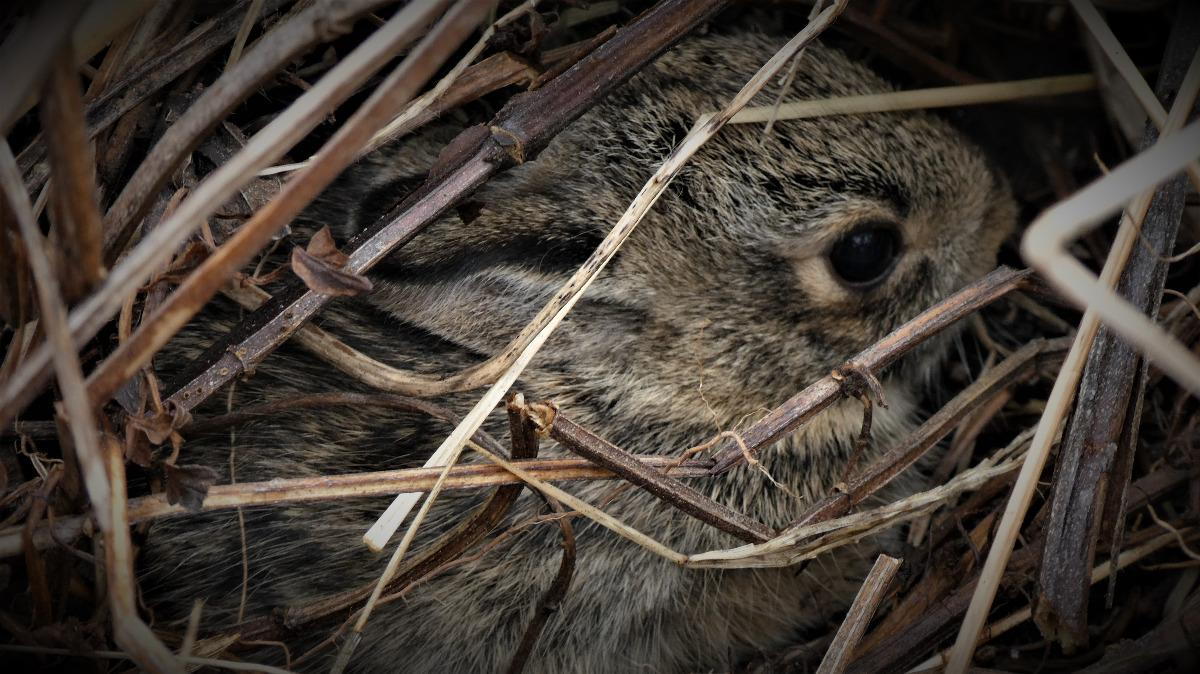What to Do if You Find a Rabbit's Nest

- posted: May 08, 2022
What to Do if you Find a Rabbit’s Nest
Spring means bunnies are everywhere! The Eastern Cottontail is the main species in Pennsylvania. Wild rabbits begin nesting mid-March through August or September. Female rabbits called “does” can have 3-8 babies or “kits” per litter and can have about five litters per breeding season. That’s roughly 25 babies per rabbit! Pregnancy lasts for about thirty days. Babies are born in poorly concealed shallow burrows or nests lined with fur and covered with brush or grass. Baby bunnies are born with their eyes closed but mature quickly and are ready to leave the nest after about two weeks.
Mother rabbits do not stay in the nest with the young to avoid having their scent attract predators, so, chances are, if you accidentally uncover a nest, you won’t find mom. A doe also only nurses her kits once every 12-24 hours. Many people mistake unattended rabbit nests for being abandoned, but this is typically not the case. If you accidentally uncover a rabbit’s nest, simply re-cover it and leave it alone. Baby bunnies that have gone astray can also be placed back in the nest without being rejected. Baby rabbits are still quite small when they become independent from their mothers and venture out on their own. Roughly 3/4 the size of a dollar bill, young rabbits often freeze in place instead of running away if they feel threatened.
In most cases, the best advice is to leave wild babies alone. More than likely, mom is nearby and the bunny is probably NOT abandoned. You should NOT try to keep an injured baby and nurse it or keep an orphaned baby as a pet. ALL wildlife in Pennsylvania are protected by state and federal laws and it is ILLEGAL to care for injured or abandoned wildlife without a PA Game Commission License or to keep one as a pet. Please leave the care of wild species to their animal parents whenever possible or contact a licensed rehabilitator so the animal gets the care it needs and can hopefully be released back into the wild where it belongs. Resist the urge to interfere! Remember, babies will be alone for periods of time. Your job is to keep cats, dogs, or kids away and allow nature to take its course.
However, rabbits don’t always pick good places for their nests. If a nest is in an area where it may be in danger of being run over by a lawn mower or raided by the family pet, you may be able to relocate it to a safer area. According to the Indiana House Rabbit Society, “Nests can be moved to a safer place up to 10 feet away from the original site and can be reconstructed if necessary. To make a new nest, dig a shallow hole about 3 inches deep and put into it as much of the original material as you can recover, including the mother's fur. Add dried grass as needed, and put the young back. To determine if the mother is returning, create a tic-tac-toe pattern over the nest with twigs. Wait 24 hours to see if the twigs have been removed. If they have, then the mother is coming back.”
If you do find an injured or truly abandoned baby rabbit, contact Raven Ridge Wildlife Center at PO Box 38 Water Street, Washington Boro, PA (717) 808-2652 or check the PA Association of Wildlife Rehabilitators website: https://pawr.com/ for a licensed rehabber near you.
FYI: Raven Ridge treats raptors, water fowl and mammals other than deer or bear. They are not licensed to treat songbirds, pigeons or reptiles.
This blog brought to you by the Patton Veterinary Hospital serving Red Lion, York and the surrounding communities.
https://www.psu.edu/dept/nkbiology/naturetrail/speciespages/cottontail.htm
http://www.indianahrs.org/rabbit-care/wild-rabbits.asp
https://ravenridgewildlifecenter.org/
Location
Patton Veterinary Hospital
425 E Broadway
Red Lion, PA 17356
